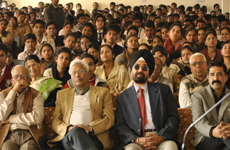By I C Naik
Members can’t distinguish society from building and fail to connect. These two are distinct in more than one way, though they are so much inseparable that people often refer to other when they meant the one: for example when one enters the gate he enters the building and not the society, the society is as much invisible as much the building is visible.
The society is a matte perception of members. The society is present in general body meeting of its members convened to transacts certain businesses related to building as well as to the society itself, in fact much more about the society itself as the building management is almost fully vested in the managing committee . The thin attendance is the proof that members fail to feel their ownership of the building through membership of the society.
Approving capital expenditure for a project or major replacement is a business related to building but approving audited accounts, rectification report, appointing auditor, electing managing committee members all are related to the society. The Society (the members constituting a quorum,) is approving its accounts.
Many members rake up quarrel about certain repairs in relation to a flat or common area. They say society will bear the costs. If there is a free lunch by the society the people are very happy because it is free, but can it really? What is the source of revenue to the society to give free lunch?
If we take a close look at Bye-Laws its connect to building property is minimal for example, object Bye-Law no 5 has two clauses (a) and (b) pertain to building but rest are about the society as a juristic person. Even definitions of several terms includes only three terms, flat, parking and common areas. Rest of the definition clauses are about the society. Out of 175+ Bye-Laws little more than dozen number (about 10% in number) relates to building/property.
Take the case of Associate Member to understand the difference in sharp focus. Associate in most cases is unconcerned with the flat/property and is only connect is with the society having just a one right of becoming a proxy of the original member in general body meeting. Even if he were to occupy the flat on his own with the member staying somewhere else e.g. Bye-Law No 24 (b) [Model 2014) The Associate/Nominal Member may have a right to occupy the flat with the consent of the Member and written intimation to the Society, subject to the conditions set out by the General Body Meeting.
Even if we look at Society’s expenses and building maintenance expenses two distinct themes emerge in sharp focus. The former is related to the society as a judicial person owning the property but the later the society outgoings from the funds of the society which are built up by members by contributing necessary funds out of their post tax surplus of income. The society’s administration is run on expenses which are met from society’s income like NOC, Interest on delayed, contribution and parking fees or interest on Reserve Funds parked outside.
The members are concerned with day to day issues concerning amenities and services which are related to building. They are far more involved as residents in the building and less as members of the society as a body and do not feel a part of responsible as a collective body about society matters. They cannot see them as individual parts of this collective body as much they experience their belonging to the flat and the property.
They assume no responsibility as part of such collective body towards the obligations as a legal person. They do not see the need of it nor do they feel concerned as they fail to grasp that both exist as entities wholly dependent on each other. One is not there without the other. If there is no building one does not need a society and there is a society because there is building belonging to several personalized parts (flats) paid for by members individually and one part owned collectively with no knowledge as to how much of it’s costs was paid by them and may be on that count fail to see the both as distinct identities both equally needed by them.
